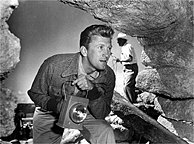Reuters Buries the Lead--and the Truth
There's an expression in journalism, "burying the lead," meaning you write a story in a way that doesn't disclose what happened until further down in the article. The Reuters "news" service is an expert at "burying the lead"--and the truth--in its reporting on Middle East violence.
Note the story that ran on the wire today, written by the Reuters' Palestinian propagandist Nidal al-Mughrabi, with the passive-voice headline "Israeli, Palestinian militant killed in Gaza attack." As if the two were sharing a foxhole when a shell landed.
The lead paragraph says "A Palestinian gunman and an Israeli soldier were killed in an exchange of fire in the southern Gaza Strip on Sunday after militants fired anti-tank missiles at Israeli troops and civilian labourers."
Only in the fifth paragraph do we find out what happened: "Palestinian gunmen launched anti-tank rockets and opened fire at a group of troops and civilians carrying out engineering work along the border."
Oh, so it was an unprovoked attack. It was a murder mission aimed at civilians as well as soldiers. Gee, Reuters, why didn't you say so in the first place?
The reason, of course, is that it is Reuters editorial policy to soft-peddle violence by Palestinian terrorists.
It is also Reuters editorial policy to give terrorists a soapbox whenever possible.
Thus Nidal al-Mughrabi did not feel his job was finished by simply writing a story with an inaccurate, misleading lead paragraph. He got on the phone with the murderers and gave them an opportunity to provide this extraordinarily cynical, cold-blooded statement: "'Calm is in real danger because of the continuation of the Israeli aggression,' senior Islamic Jihad leader Nafez Azzam told Reuters."
So what we have here is a double-header: An unprovoked attack is whitewashed and a terrorist is given a platform. That's Reuters for you--always trying to belt one out of the ball park with every story. Nice going!
Note the story that ran on the wire today, written by the Reuters' Palestinian propagandist Nidal al-Mughrabi, with the passive-voice headline "Israeli, Palestinian militant killed in Gaza attack." As if the two were sharing a foxhole when a shell landed.
The lead paragraph says "A Palestinian gunman and an Israeli soldier were killed in an exchange of fire in the southern Gaza Strip on Sunday after militants fired anti-tank missiles at Israeli troops and civilian labourers."
Only in the fifth paragraph do we find out what happened: "Palestinian gunmen launched anti-tank rockets and opened fire at a group of troops and civilians carrying out engineering work along the border."
Oh, so it was an unprovoked attack. It was a murder mission aimed at civilians as well as soldiers. Gee, Reuters, why didn't you say so in the first place?
The reason, of course, is that it is Reuters editorial policy to soft-peddle violence by Palestinian terrorists.
It is also Reuters editorial policy to give terrorists a soapbox whenever possible.
Thus Nidal al-Mughrabi did not feel his job was finished by simply writing a story with an inaccurate, misleading lead paragraph. He got on the phone with the murderers and gave them an opportunity to provide this extraordinarily cynical, cold-blooded statement: "'Calm is in real danger because of the continuation of the Israeli aggression,' senior Islamic Jihad leader Nafez Azzam told Reuters."
So what we have here is a double-header: An unprovoked attack is whitewashed and a terrorist is given a platform. That's Reuters for you--always trying to belt one out of the ball park with every story. Nice going!


<< Home